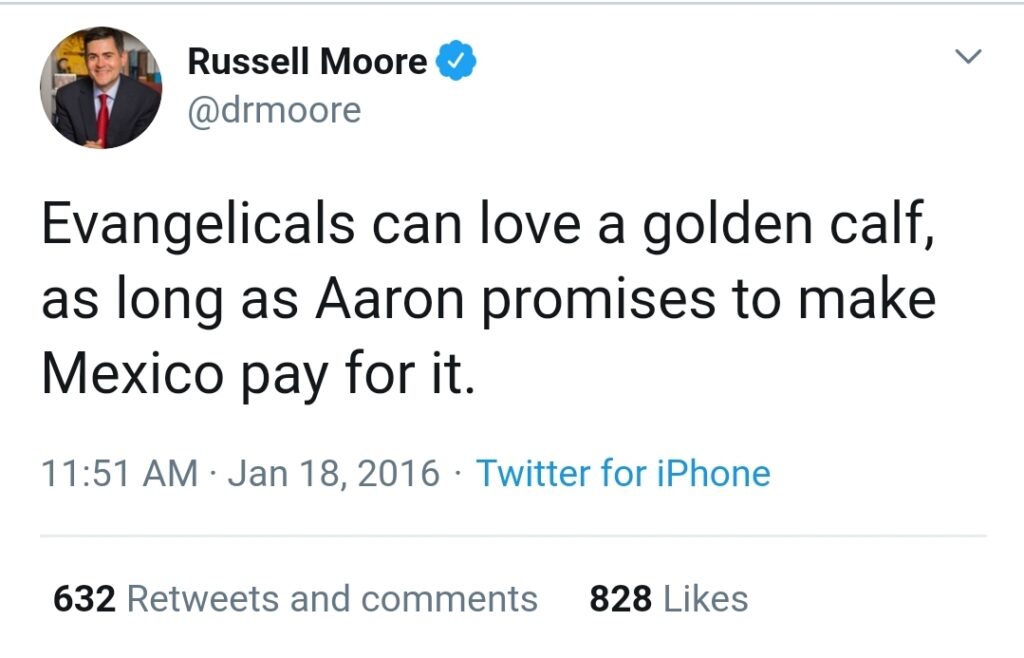MODERNITY AND THE CHURCH
Across the tattered landscape of “conservative” Christianity an interesting divide is taking shape. The division mirrors a broader political and cultural schism. The Nationalist-Populist/Globalist-Elitist dynamic has an often ignored religious dimension. The battle between the unwashed hoi polloi and their elitist masters—a division that increasingly defines modern politics- has come to church.
Regrettably, the division between Evangelical elites and pew-sitting deplorables extends far and wide. While secular institutions take up arms to “tear down the patriarchy” and root out “white privilege,” the same conflict rages within the most conservative precincts of the Christian church.
The infection has seeped far beyond the bastions of mainline Protestantism and into denominations such as the Presbyterian Church in America (PCA) and the Southern Baptist Convention (SBC), America’s largest Protestant denomination, which has more than 47,000 congregations.
Post-modern assumptions have been smuggled into conservative churches, denominations and parachurch ministries via the Trojan Horse of “racial reconciliation,” “social justice,” and the #ChurchToo movement. Teaching and doctrine borrowed from Black Liberation Theology, Critical Race Theory and Intersectional Feminism are being proclaimed from pulpits, conference lecterns and the Twitter feeds of Evangelical spokesmen and leaders.
Back in 1995, Samuel Francis prophesied the growing liberalization of traditionally conservative churches and denominations. In an infamous column written for the Washington Times, which led to the loss of his position as a staff columnist, Francis criticized the SBC for approving a resolution apologizing for slavery.
Francis predicted that churches subordinating scripture to liberal morality would accept a “bastardized version of Christian ethics” permeated by the “pseudo-Christian poison of equality.” “Now that they’ve decided to join the parade toward that destination,” wrote Francis, “We can expect them to adopt some even more modern resolutions that will pave the road for them.”
Ever the prophet, Francis’s prediction took roughly twenty years to come to fruition. Aside from a ritual denunciation marking the 150th anniversary of Dred Scott, the SBC avoided racial issues until 2015 when it passed a resolution on “racial reconciliation,” urging affiliated churches and entities to increase representation of non-White leadership.
The goalposts quickly shifted with talk of reconciliation cast aside in favor of more aggressive denunciations of “structural racism” and “White privilege” along with broader attacks on historical symbols and the Dissident Right.
In 2016, the SBC repudiated the display of the Confederate Flag–a rejection of its own founding; in 2017 it denounced the “Alt Right” and “white supremacy,” neither of which were defined nor running rampant in SBC churches; in 2018 SBC organizations held conferences lionizing Martin Luther King Jr.; and in 2019 the convention adopted a resolution endorsing the use of Critical Race Theory and Intersectionality as an analytical tool.
Russell Moore, president of the Ethics & Religious Liberty Commission, the public-policy arm of the Southern Baptist Convention, spent most of 2016 assailing Donald Trump and his voters. Given that 81% of White Evangelicals voted for Trump, this represented an attack on the folks filling Southern Baptist pews and paying his salary through the SBC cooperative program, through which affiliated SBC churches support state convention and SBC missions and ministries.
Moore, who once called Jesus an illegal immigrant, said that Trump was breathing life into the White Supremacist movement. He compared Trump’s clerical supporters to Kool Aid drinking cultists. Describing himself as a survivor of “Bible Belt America,” he called Trump a “Bronze Age warlord” and accused his Christian supporters of worshiping a golden calf.

As looters have burned and pillaged cities and mobs of iconoclasts set upon the cultural legacy of America, SBC leaders bent the knee before Black Lives Matter and poured gasoline on the proverbial fire.
Southern Baptist Convention President J. D. Greear denounced phrases like “all lives matter” saying, “Southern Baptists, we need to say it clearly as a gospel issue: Black lives matter.”
Greear also warned fellow Baptists to refrain from bringing facts to bear on any discussion of “systemic racism.” “Let’s spare each other the quoting of stats right now,” Greear said. Tossing around biblical tropes about “neighbor love” and “weeping with those who weep,” pastors have cancelled data-driven analysis and replaced it wholesale with an empathy cut off from all other virtues.
In an attempt at triangulation and “gospel winsomeness,” Gospel Coalition editor and ERLC communications specialist Joe Carter called Confederate soldiers traitors. He penned a rambling diatribe advocating the removal of Confederate monuments while meekly offering that “reasonable Christians may disagree” as to whether George Washington’s ownership of slaves means that images of the indispensable man should be purged from public life.
Demanding a change to the state flag, the Mississippi Baptist Convention made the audacious claim that “the need to change the flag is a matter of discipleship for every follower of Jesus Christ.”
Increasingly, the clergy and those training the coming generation of pastors have embraced emancipatory politics and critical theory turning politics into a Manichean struggle between the “White Patriarchy” and “people of color” and “oppressed” women.
But good men are beginning to rise, shining a light on the infiltration of seminaries and entire denominations by postmodernism and Critical Race Theory. Others are finally beginning to teach their flocks about the poison of Cultural Marxism, identity politics, so-called “White Privilege,” and social justice.
Christians looking to slow the spread of social pathogens wreaking havoc in the body politic should stop tithing to institutions and churches that are taking a hammer to what remains of Western Civilization and the faith that sustains it. Instead, they should give resources, financial and otherwise, to the relative handful of shepherds that have not bent the knee to Baal.
-By Scot Olmstead